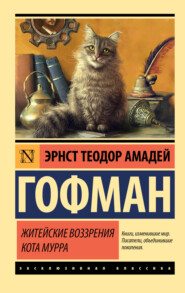По всем вопросам обращайтесь на: info@litportal.ru
(©) 2003-2024.
✖
Specimens of German Romance; Vol. II. Master Flea
Настройки чтения
Размер шрифта
Высота строк
Поля
The old woman could not talk enough of the great heap of clothes which the princess brought out of a variety of chests and showed to her, each of which had appeared richer than the other. She declared that none but an Indian princess could possess such jewels as the little one; her eyes still ached with the glitter. She then went on to say how, during the dressing, she had talked of this and that, of the late Mr. Tyss, on the delightful life they had formerly led in the house, and at last the conversation had fallen upon her deceased relations.
"You know, my dear Mr. Tyss, that nothing is more valued by me than my late cousin, the calico-printer's wife. She was in Maintz, and, I believe, even in the Indies, and could speak French and sing. If I owe to my cousin the unchristian name of Alina, I will forgive her that in the grave, since it is from her alone that I have learnt polite manners and the art of speaking elegantly. As I was talking much of my cousin, the little princess asked after my father, my grandfather, and so on, higher and higher up the family. I opened my heart to her, told her that my mother had been almost as handsome as myself, except that I go beyond her in regard to the nose, which I derive from my father, and which is after the shape that has been usual in the family since the memory of man. Then I came to speak of the country-wake, when I waltzed with Serjeant Drumstick, and wore the skyblue stockings with red clocks. Ah, dear God! we are all weak, sinful creatures! But oh! Mr. Tyss, you should have seen how the little princess, who at first had laughed and tittered, that it was a pleasure to hear her, now grew more and more quiet, and gazed on me with such odd looks, that I began to be terribly alarmed.–And then think, Mr. Tyss, on a sudden, before I could prevent it, she lies on her knees before me, and will positively kiss my hand, exclaiming, 'Yes, it is you! Now I recognise you! It is yourself!'–and when, quite astonished, I asked what it all meant,–"
Here the old woman stopt, and, when Peregrine pressed her to go on, she with great gravity and precision took a mighty pinch of snuff, and said,
"You'll know in good time, my son, what farther happened. Every thing has its time and hour."
He was now more urgent than ever with the old woman to proceed, when she burst out into a roaring fit of laughter; upon which he admonished her, with a very sour face, that his room was not exactly the place for her to play off such fooleries. But the old woman, planting her hands in her sides, seemed ready to burst. The burning red of her brow changed to an agreeable mahogany, and Peregrine was upon the point of flinging a glass of water into the old woman's face, when she recovered her breath and speech at the same time.
"I can't help laughing," she said, "I can't help laughing at the foolish little thing. No; such love is no longer on earth. Only think, Mr. Tyss,–"
Here she broke out into a fresh fit of laughter, and Peregrine's patience was well nigh exhausted. At last, with much difficulty, he got out of her that the little princess had taken up the whimsical notion of Mr. Tyss being positively determined to marry the old woman, and had compelled her solemnly to promise to reject his hand.
It seemed to Peregrine as if he were mixed up in a scene of witchery, and he felt so strangely, that even the honest old Alina appeared to him a supernatural kind of being, from whom he could not fly with sufficient speed. But she still detained him, having something to communicate in all haste, that concerned the little princess.
"It is now certain," she said confidentially,–"it is now certain, my dear Mr. Tyss, that the bright star of fortune has arisen, but it is your business to keep it favourable. When I protested to the little one that you were desperately smitten with her, and far from any idea of marrying me, she replied, that she could not be convinced of it and give you her hand till you had complied with a wish that had long sate near her heart. She says, that she had a pretty little negro boy in her service who had fled from her; I have, indeed, denied it, but she maintains that the boy is so little he might live in a nutshell.
"Nothing will ever come of this," exclaimed Peregrine violently, well knowing what the old woman was driving at, and rushed out of the room, and then out of the house, with great vehemence.
It is an established custom, that when the hero of a tale is under any violent agitation, he should run out into a forest, or, at least, into some lonely wood; and the custom is good, because it really prevails in life. Hence it could not be otherwise with Mr. Tyss, than that he ran from his house without stopping, till he had left the city behind him and reached a remote wood. Moreover, as in a romantic history no wood must be without rustling leaves, sighing breezes, murmuring brooks, &c. &c. it is to be supposed that Peregrine found all these things in his place of refuge. Upon a mossy stone, the lower half of which lay in a bright brook, Peregrine sate down with a firm resolution to reflect on his strange adventures, and, if possible, find the Ariadne clue which might show the way out of this labyrinth of mysteries. The murmurs of the leaves, returning at equal intervals, the monotonous babbling of the waters, the constant clap, clap of a distant mill, soon formed a ground which regulated the thoughts so that they no longer rushed wildly together without time or rhythmus, but became an intelligible melody. Thus, after sitting some time on this pleasant spot, he got to reflect calmly.
"In reality," he said to himself, "a fantastic tale-writer could not have invented wilder events than I have actually gone through in the short space of a few days. Beauty, love itself visits the lonely mysogunist, and a look, a word, is sufficient to fan, in his breast, the flames which he had dreaded without knowing them. But the time, the place, the whole appearance of the strange syren are so mysterious, that it seems to be the result of magic;–And then it is not long before a despised little insect evinces knowledge, understanding, nay, even a sort of supernatural power. And this creature talks of things, which to common minds are incomprehensible, in a way as if it all were nothing more than the familiar to-day and yesterday of usual life, as it appears repeated for the thousandth time.
"Have I come too near the fly-wheel, that dark unknown powers are driving, and has it caught me in its whirlings? Would not one believe, that the reason must be lost with such things, when they cross the path of life? And yet I find myself quite well, withal: nay, it no longer seems strange to me that a Flea-king should have sought my protection, and, in requital have entrusted me with a mystery that opens to me the secrets of thought, and thus sets me above the deceptions of life. But whither will or can all this lead? How, if under this singular mask of a flea, an evil demon lurked, who sought to lure me into destruction, who aimed to rob me of all the happiness that might bloom to me in the possession of Dörtje? Were it not better to get rid at once of the little monster?"
"That was a very pitiful idea, Mr. Tyss!" exclaimed Master Flea, interrupting Peregrine's soliloquy. "Do you imagine that the mystery I have entrusted to you is a trifle? Should not this gift pass for the most decided proof of my sincere friendship? Shame on you for being suspicious! You are surprised at the reason, the mind, of a little despised insect; and that proves,–don't be offended,–the narrowness of your education in science. I wish, in regard to the thinking instinctive soul of animals, you had read the Greek Philo, or, at least, the treatise of Hieronymus Rorarius, 'quod animalia bruta ratione utantur melius homine; or his oration 'Pro muribus;'–or that you knew what Lipsius and the great Leibnitz thought of the mental power of beasts, or that you were aware what the profound Rabbi Maimonides has said about their souls; you would not then take me for a demon on account of my understanding, or measure the spiritual faculties by the proportions of the body. I suppose, at last, you will come to the shrewd opinion of the Spanish physician, Gomez Pereira, who could find nothing more in animals than mere artificial machines, without thought or freedom of will, moving arbitrarily and automatically. Yet, no; I cannot deem you so absurd, and am convinced that you have long ago learnt better through my humble person. Moreover, I do not well understand what you call wonders, or in what way you are able to divide, into the wonderful and natural, the appearances of our being, which, in reality, are ourselves, as we and they mutually condition each other. Do not, therefore, wonder at any thing because it has not yet occurred to you, or because you fancy you do not see the connexion of cause and effect; that only proves the natural or diseased obtuseness of your sight, which injures your perception. But,–do not take it amiss, Mr. Peregrine,–the drollest part of the business is, that you want to split yourself into two parts, one of which recognises and willingly believes the so-called wonders; the other, on the contrary, is mightily astonished at this recognition and belief. Has it ever occurred to you, that you believe in the images of dreams?"
"I!" exclaimed Peregrine–"My dear fellow, how can you talk of dreams, which are only the result of some disorder in our corporeal or intellectual structure?"
At these words Master Flea burst into a laugh, as fine as it was mocking, and then said to Mr. Tyss, who was not a little confounded,
"My poor friend, is your understanding so little enlightened, that you do not see the folly of such opinions? Since the time that Chaos melted together into plastic matter,–it may be a tolerably long time ago,–the spirit of the universe has formed all shapes out of this existing material, and from this come also dreams and their images. These images are sketches of what has been, or probably of what is yet to be, which the soul rapidly puts together for its amusement, when the tyrant, called body, has released it from its slavish servitude. But here is neither time nor place to refute you, and bring you to a better conviction; perhaps, too, it would be of no use whatever to you: one thing only I should like to explain."
"Dear master," cried Peregrine, "speak, or be silent, as you think proper; do what to you seems best; for I plainly perceive that, however small you may be, you have deep knowledge and sound understanding. You compel from me unconditional confidence, although I do not quite comprehend your figurative modes of speech."
"Learn then," resumed Master Flea, "that you are very strangely implicated in the history of the Princess Gamaheh. Swammerdamm and Leuwenhock, the Thistle, Zeherit, and the Leech-Prince, as well as the Genius, Thetel, are all striving after the princess; and even I myself must confess that, alas! my old passion is reviving, and I could be fool enough to share my sovereignty with the false fair-one. But you,–you, Mr. Peregrine, are the principal person, and, without your consent, Gamaheh can belong to no one. If you wish to understand the more particular connexion of the whole, which I myself do not know, you must speak to Leuwenhock about it; he has found it out, and will certainly let out much, if you will take the pains, and know how to question him."
Master Flea was about to continue, when a man leapt from the bushes in boiling passion, and flew upon Peregrine.
"Ha!" cried George Pepusch, with frantic gestures,–for it was he,–"Ha! faithless, treacherous friend! have I found you?–found you in the fateful hour? Up then! pierce this breast, or fall by my hand."
With this he drew a brace of pistols from his pocket, pressed one into Peregrine's hand, and took his ground with the other, crying, "Shoot, coward! shoot!"
Peregrine placed himself, but declared that nothing should induce him to the incurable madness of entering into a duel with his only friend, without even a suspicion of the cause. At all events he would in no case be the first to begin a murderous attack.
At this Pepusch burst into a wild laugh, and in the same moment the ball went through Peregrine's hat. The latter remained staring at his friend, in profound silence, without picking up the hat, which had fallen to the ground, when Pepusch advanced a few steps towards him, and murmured in a hollow voice, "shoot!"–Peregrine fired his pistol in the air.
With the voice and gestures of a madman, Pepusch now flung himself upon his friend's breast, and cried out, in heart-rending tones,–"She is dying! dying for you, unlucky one! Quick!–save her! You can do it–save her for yourself, and let me perish in my despair!"
Pepusch ran off so fast that Peregrine had lost sight of him on the instant; and now a fearful foreboding came over him, that his friend's mad behaviour must have been occasioned by something terrible which had happened to the little-one: whereupon he hastened back to the city.
On entering his house, he was met by the old woman, loudly lamenting that the poor princess was on the sudden taken violently ill, and was dying. Mr. Swammer himself had gone after the most celebrated physician in Frankfort.
With the feelings of death at his heart, he crept into Mr. Swammer's room that was opened to him by the old woman. There lay the little-one upon a sofa, pale and stiff like a corse; and it was not till he knelt down and bent over her that he perceived her gentle breathing. No sooner had he touched her icy hand, than a painful smile played about her lips, and she lisped,–
"Is it you, my sweet friend? Have you come to see her once again, who loves you so unspeakably,–who dies, alas! because she cannot breathe without you?"
Dissolving in sorrow, Peregrine poured himself forth in protestations of the tenderest love, and repeated, that nothing in the world was so dear to him that he would not sacrifice it to her. Out of words grew kisses, but in these kisses again words, like the breathings of love, were distinguishable.
"You know, my Peregrine, how much I love you. I can be yours; you, mine,–I can recover on the spot–you will see me bloom again in my youthful splendour, like a flower refreshed by the morning dew, and joyfully lifting up his drooping head–but–give me up the prisoner, my dear, beloved Peregrine, or else you will see me perish, before your eyes, in unutterable death-pangs.–Peregrine–I can no more–it is all over!"
With this she sank back upon the cushions, from which she had half raised herself; her bosom heaved tumultuously up and down, as if, in the death-pangs; her lips grew bluer, and her eyes seemed to break.
In wild anguish Peregrine caught at his neckcloth, from which Master Flea now leapt, of his own accord, upon the white neck of the little-one, exclaiming, in a tone of the deepest grief–"I am lost I!"
Peregrine stretched out his hand to catch the Master, but suddenly it seemed as if some invisible power held back his arm; and far other thoughts ran through his head than those which till now had occupied it.
"How!" thought he–"because you are a frail man, and influenced by a mad passion, will you therefore betray him, to whom you have promised your protection? Will you therefore plunge a free, harmless people into eternal slavery, and utterly ruin the friend whose thoughts and words agree?–No–no–recollect yourself, Peregrine!–Rather die than be a traitor!"
"Give–up–the prisoner–I am dying!" stammered the little one, with failing voice.
"No!" cried Peregrine, while in despair he caught her in his arms–"No! never! But let me die with you!"
And now a fine, penetrating harmony was heard, as if little silver bells were struck. Dörtje, with fresh roses on her lips and cheeks, started up suddenly from the sofa, and, breaking into a convulsive laughter, skipt about the chamber. She seemed to have been bit by the tarantula.
Peregrine gazed in terror on the strange spectacle, and the same did the physician, who stood at the door quite petrified, keeping out Mr. Swammer, who had followed him.
Sixth Adventure
Strange behaviour of strolling jugglers in a tavern, together with a tolerable buffeting.–Tragical history of a tailor at Sachsenhausen.–How George Pepusch astonished some honest folks.–The horoscope.–Pleasant battle of some well-known people in Leuwenhock's apartments.
All the passers-by stopt, stretched out their necks and peeped through the window into the coffee-room. With every moment the crowd grew greater, the pressure more violent, and the noise louder. All this was occasioned by two strangers, who, besides that their form, their dress, their whole manner had something extraordinary about it, that was repulsive and ridiculous at the same time, played off many wonderful tricks, such as had never been seen before. The one, an old man, of a dirty, disagreeable appearance, was dressed in a surtout of shining stuff. Sometimes he made himself thin and long, sometimes he would shrink himself up to a short fat fellow, winding about all the time like a worm. The other, with powdered hair, motly silk coat, under-dress of the same, large silver buckles, and altogether resembling a petit-maitre of the last half of the foregoing century, repeatedly flew up to the ceiling, and then gently let himself down again, while, with a cheerful voice, he trilled discordant songs in a language altogether unknown.
According to the host's declaration, they had both come in–one a short time after the other–like orderly people, and had called for wine. Then they had gazed more and more keenly on each other, and entered into conversation; and although the language of it was unintelligible to all the guests, yet their tone and manner showed they were engaged in a dispute, which grew warmer and warmer. On a sudden they had taken their present form and began these mad tricks, which continually attracted more spectators.
"The man, who flies up and down so admirably," exclaimed one of the spectators, "is the clock-maker, Degen, of Vienna–he who invented the flying machine, with which he is constantly contriving to tumble down upon his nose."
"No," replied another; "that is not the clock-maker. I should rather fancy that it was the Little Tailor of Sachsenhausen, if I did not know that the poor thing was burnt."
I know not whether my readers are acquainted with the Little Tailor of Sachsenhausen? Here it is.
History of the Little Tailor of Sachsenhausen
It happened that a pious little tailor, at Sachsenhausen, was coming out of church one Sunday with his wife, in all his best attire. The air was raw, the little tailor had taken nothing over night but a soft boiled egg and a few pickled gerkins, and in the morning a cup of coffee. Moreover he had been singing most vehemently in the church, and hence he began to feel in a piteous plight, and to long for a dram. As he had worked hard through the week, and had been particularly kind to his better-half, making her a very pretty gown out of the pieces cabbaged from his customers, she consented to his going into the apothecary's and getting himself a dram, which he did accordingly. The awkward apprentice, who was alone in the shop, made a mistake, and took down a bottle which, instead of a dram, contained inflammable gas, wherewith balloons are filled. Of this the apprentice poured out a full glass, and the tailor, putting it at once to his mouth, swallowed off the gas as an agreeable reviver. It made him, however, feel very strangely,–as if he had got a pair of wings on his shoulders, or as if some one were playing at foot-ball with him; for he felt himself compelled to jump up and down in the shop, and with every moment the impetus increased.
"Eh! Gemini! Gemini!" he cried,–"what a nimble dancer I have grown!"
The apothecary's apprentice stood with his mouth gaping wide from pure wonder, when it chanced that some one opened the door so hastily, that the opposite window flew open also. A strong current of air poured in, caught up the little tailor, and away he sailed through the window, since when he has not been seen; but it happened some time after, that the people of Sachsenhausen observed in the air a fire-ball, which lighted the whole country with its brightness, and then, being extinguished, fell to earth. All were eager to know what had dropt, and ran to the place, but found nothing more than a little heap of ashes, but with this the tongue of a shoe-buckle, a little piece of yellow satin with flowers, and a something black, which, to look at, was like the horn-top of a walking stick. All were in deep council how such things could fall down from heaven in a fire-ball, when the wife of the departed tailor came up, and, on seeing these things, wrung her hands, took on most piteously, and cried out, "Ah, woe! that is my husband's buckle!–Ah, woe! that is my husband's Sunday waistcoat!–Ah, woe! that is my husband's cane-top!"–A very learned man, however, has declared that the cane-top was no cane-top, but a meteoric ball, or an abortive globe.

















